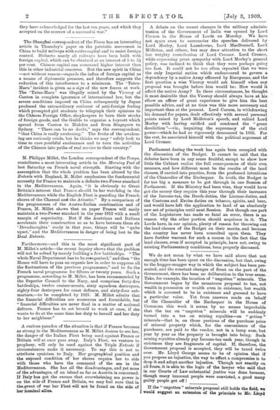We do not mean by what we have said above
that not enough time has been spent on the discussion, but that, owing to the hugger-mugger way in which the subject has been pre- sented, and the constant changes of front on the part of the Government, there has been no deliberation in the true sense. Take, for example, the taxation of " ungotten." minerals. The Government began by the monstrous proposal to tax, not wealth in possession or wealth even in existence, but wealth which is assumed to be in existence and guessed to have a particular value. Yet from answers made on behalf of the Chancellor of the Exchequer in the House of Commons this week it seems by no means improbable that the tax on " ungotten " minerals will be suddenly turned into a tax on mining royalties—on " gotten " minerals—that is, on those portions of the purchase price of mineral property which, for the convenience of the purchaser, are paid to the vendor, not in a lump sum, but year by year as the property is brought into being. Such mining royalties already pay Income-tax each year, though in strictness they are fragments of capital. If, therefore, the Government proposal is accepted, they will be taxed twice over. Mr. Lloyd George seems to be of opinion that if you propose an injustice, the way to effect a compromise is to drop it and adopt another injustice. Though not exactly on all fours, it is akin to the logic of the lawyer who said that in our Courts of Law substantial justice was done because, though many innocent people were convicted, a good many guilty people got off !














































 Previous page
Previous page